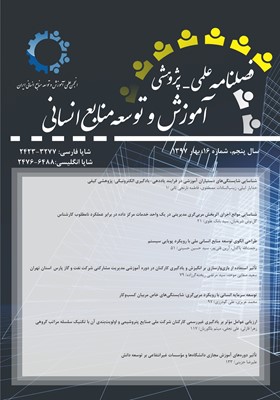شناسایی شایستگیهای دستیاران آموزشی در فرایند یاددهی-یادگیری الکترونیکی: پژوهشی کیفی
محورهای موضوعی :خدایار ابیلی 1 , زینب السادات مصطفوی 2 , فاطمه نارنجی ثانی 3 *
1 - علوم تربیتی
2 - دانشگاه تهران
3 - روانشناسی و علوم تربیتی دانشگاه تهران
کلید واژه: دستیار آموزشی, آموزش عالی, فرایند یاددهی-یادگیری الکترونیکی, شایستگی, پژوهش کیفی.,
چکیده مقاله :
پژوهش حاضر باهدف شناسایی ابعاد و مؤلفههای شایستگیهای دستیاران آموزشی در محیط یادگیری الکترونیکی انجام شده است. روش پژوهش از نظر هدف کاربری و از منظر گردآوری اطلاعات ازنوع کیفی- اکتشافی است. جامعه آماری پژوهش، دستیاران متخصص و باتجربه در محیط یادگیری الکترونیکی بوده است. برای نیل به هدف پژوهش ادبیات، مبانی نظری و تجربی تحقیق مطالعه شد. هم چنین با استفاده از روش مصاحبه اکتشافی نیمه ساختار یافته با 22 نفر از متخصصین در زمینهی موضوع، به صورت هدفمند، اطلاعات گردآوری و با استفاده از روش تحلیل محتوا مورد تجزیه و تحلیل قرار گرفت. بر اساس نتایج پژوهش، مدل شایستگیهای دستیاران در چهار بعد: شایستگیهای تخصصی- حرفهای (آموزشی، پژوهشی، دانش موضوعی، مدیریت کلاس) شایستگیهای میان فردی ارتباطی- اجتماعی (فعالیت تیمی و تعاملی)، شایستگی های مرتبط با فناوری اطلاعات و ارتباطات (تفکر فناوری اطلاعات و ارتباطات، دانش فناوری اطلاعات و ارتباطات، مهارت فناوری اطلاعات و ارتباطات) و شایستگیهای عمومی و فردی (ادراکی، خلاقیت و نوآوری، اخلاق و رفتاری) شناسایی و طراحی شد.
The purpose of this study was to identify the dimensions and competency components of teacher assistants in electronic learning context. It was an applied research with exploratory qualitative Methodology. The statistical population of the study was specialist assistants with experience in the e-learning environment. To achieve the goal of research, the theoretical and empirical literature of the research were studied. The data were collected, using a semi-structured interview method with 22 experts in the subject area, and analyzed using content analysis method. Based on the results of the research, the competency model of the assistants in four dimensions was as follows: professional-professional competencies (educational, research, subject knowledge, class management), interpersonal communication competencies (teamwork and interactivity), competencies related to information and communication technology (thinking Information and communication technology, ICT knowledge, ICT skills) and general and individual competencies (perceptual, creativity, innovation, ethics and behavior) were identified and designed.
1. Narenji thani F, Ebadi R, Mostafavi Z, Youzbashi A. Identification of Learning Needs Among Faculty at E-Higher Education, Educational Study,2014;3(10).
2. Shopova T. E-learning in Higher Educational Environment. Italy: International Conference the Future of Education.2012.
3. Venkataraman S, Sivakumar S. Engaging Students in Group Based Learning Through E-Learning Techniques in Higher Education System. International Journal of Emerging Trends in Science and Technology, 2015; 2(01).
4. Pardo A, Han F, Ellis R. A. Combining University Student Self-Regulated Learning Indicators and Engagement with Online Learning Events to Predict Academic Performance. IEEE Transactions on Learning Technologies, 2017; 10(1), 82-92.
5. Seraji F, Attaran M. E-Learning. 2011. Boali Sina Publisher.
6. Usun S. Information and Communications Technologies (ICT) in Teacher Education (ITE) Programs in the World and Turkey :( A Comparative Review). Procedia-Social and Behavioral Sciences, 2009; 1(1), 331-334.
7. Rai L, Chunrao D. Influencing Factors of Success and Failure in MOOC and General Analysis of Learner Behavior. International Journal of Information and Education Technology, 2016; 6(4), 262.
8. Bartoletti R. Learning through Design: MOOC Development as a Method for Exploring Teaching Methods. Current Issues in Emerging eLearning, 2016; 3(1), 2.
9. Sun D, Liu B. Crowdsourcing Based Teaching Assistant Arrangement for MOOC." In International Conference on Database Systems for Advanced Applications, 2017; pp. 429-435. Springer, Cham.
10. McPherson M, Nunes M. B. Developing Innovation in Online Learning: An Action Research Framework. 2004. Routledge.
11. Sohoni S, Cho Y, Frenc D. P. A Survey to Capture Needs Assessment for Graduate Teaching Assistant Training. Advances in Engineering Education, 2013; 3(3), N3.
12. Dawley L. The Tools for Successful Online Teaching. 2007. IGI Global.
13. Park C. The Graduate Teaching Assistant (GTA); Lessons From North American Experience, Teaching in Higher Education, 2004; Vol. 9, No. 3, PP. 349-361.
14. Boman J. Graduate Student Teaching Development: Evaluating the Effectiveness of Training in Relation to Graduate Student Characteristics. The Canadian Journal of Higher Education, 2013; 43(1), 100.
15. Meadows K, Olsen K, Dimitrov N, Dawson D. Evaluating the Differential Impact of Teaching Assistant Training Programs on International Graduate Student Teaching. The Canadian Journal of Higher Education, 2015; 45(3), 34.
16. Staton A, Darling A.Socialization of Teaching Assistants. New Directions for Teaching and Learning, 1989(39), 15-22.
17. Miller J, Groccia J, Miller M. Student-Assisted Teaching: A Guide to Faculty-Student Teamwork. Anker Publishing Company, 2005. 176 Ballville Road, PO Box 249, Bolton, MA 01740-0249.
18. Hardre P, Burris A. What Contributes to Teaching Assistant Development: Differential Responses to Key Design Features? Instructional Science, 2012; 40(1), 93-118.
19. Levinsen K. Qualifying Online Teachers—Communicative Skills and Their Impact on E-learning Quality. Education and Information Technologies 2007; 12(1): 41-51.
20. Weidert J, Wendorf A, Gurun R, Filz T. A Survey of Graduate and Undergraduate Teaching Assistants. College Teaching, 2012; 60(3), 95-103.
21. Bubbar K, Dimopoulos A, Korpan C, Wild P. An Overview of the Teaching Assistant Consultant Program for Developing Competency in Novice Engineering Graduate Teaching Assistants. 2017. Proceedings of the Canadian Engineering Education Association.
22. Filz T, Gurung R. Student Perceptions of Undergraduate Teaching Assistants. Teaching of Psychology, 2013; 40(1), 48-51.
23. Reeves T, Marbach G, Miller K, Ridgway J, Gardner G., Schussler E, Wischusen E. A Conceptual Framework for Graduate Teaching Assistant Professional Development Evaluation and Research. CBE-Life Sciences Education, 2016; 15(2), es2.
24. Ciston S, Cerretani C, Went M. Teaching with Graduate Teaching Assistants: Tips for Promoting High Per-formance Instructional Teams. In American Society for Engineering Education (ASEE).2016. Annual Conference and Exposition.
25. Bourelle T, Bourelle A, and Rankins-Robertson S. Teaching with Instructional Assistants: Enhancing Student Learning in Online Classes. Computers and Composition, 2015; 37, 90-103.

